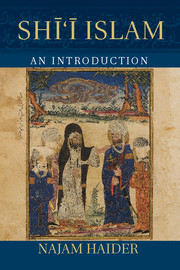Book contents
- Frontmatter
- Dedication
- Contents
- List of Tables and Maps
- Acknowledgments
- Note on the Cover Image
- A Note on Transliteration and Dating
- Maps
- Introduction
- Section 1 Theology
- Section 2 Origins
- Section 3 Constructing Shī‘ism
- Section 4 Shī‘ism in the Modern World
- 8 Zaydism at the Crossroads
- 9 (Nizārī) Ismā‘īlism Reconstituted
- 10 The Politicization of the Twelver Shī‘a
- Conclusion Sunnī–Shī‘ī Relations
- Appendix Verses Mentioned in the Argument from Qur’ānic Expectations in Chapter 3
- Index
- References
9 - (Nizārī) Ismā‘īlism Reconstituted
Published online by Cambridge University Press: 05 August 2014
- Frontmatter
- Dedication
- Contents
- List of Tables and Maps
- Acknowledgments
- Note on the Cover Image
- A Note on Transliteration and Dating
- Maps
- Introduction
- Section 1 Theology
- Section 2 Origins
- Section 3 Constructing Shī‘ism
- Section 4 Shī‘ism in the Modern World
- 8 Zaydism at the Crossroads
- 9 (Nizārī) Ismā‘īlism Reconstituted
- 10 The Politicization of the Twelver Shī‘a
- Conclusion Sunnī–Shī‘ī Relations
- Appendix Verses Mentioned in the Argument from Qur’ānic Expectations in Chapter 3
- Index
- References
Summary
This chapter focuses on the mobilization of Nizārī Ismā‘īlī communities by the Aga Khans from the nineteenth through the twenty-first centuries. The first section traces the Aga Khans’ efforts to reinscribe and consolidate their authority over the Khojas and other historically Ismā‘īlī communities. These efforts, which benefited from British colonial policies, had to overcome a Khoja communal identity that was grounded in caste as opposed to religious considerations. The second section documents the Aga Khans’ embrace of transnationalism through the creation of a network of nongovernmental organizations. These served both to extend the scope of their authority to disparate and isolated Ismā‘īlī populations and to establish them as powerful nonstate players with broad international influence. In the contemporary period, the Aga Khans play dual and perhaps contradictory roles as (i) political heads of a nonterritorial community advocating European values and (ii) authoritative Imāms of a religious community whose members are largely non-European.
The Rise of the Aga Khans
Reinscribing Authority
When the Aga Khan arrived in India in the 1840s, he encountered a Khoja community firmly entrenched in local religious and political structures. In terms of religion, the Khojas adhered to the Satpanth (True Path) tradition that “employed terms and ideas from a variety of Indic religious and philosophical currents, such as the Bhakti, Sant, Sufi, Vaishnavite, and yogic traditions to articulate its core concepts.” They straddled the lines among a variety of identities without conforming to the Muslim–Hindu dichotomy that would come to dominate India under British colonial rule.
- Type
- Chapter
- Information
- Shi'i IslamAn Introduction, pp. 182 - 199Publisher: Cambridge University PressPrint publication year: 2014



